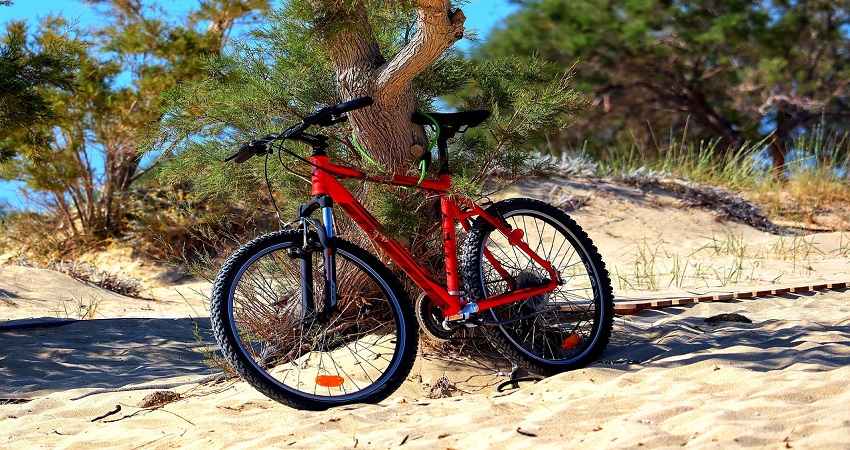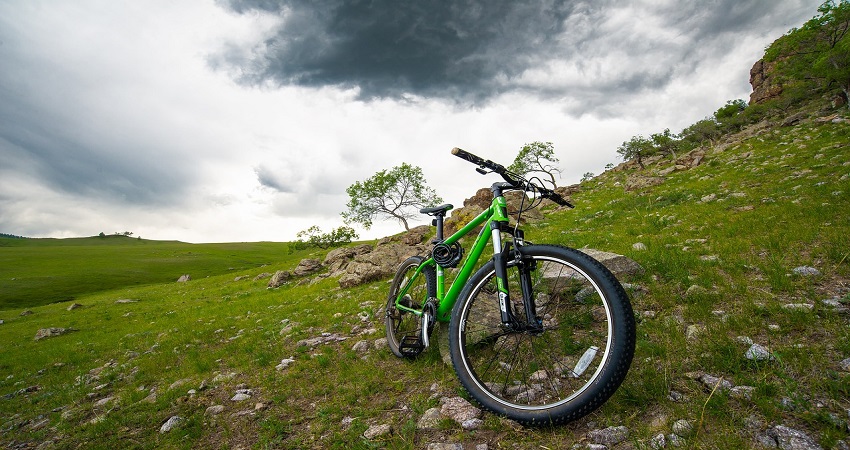Mountain bikes can be expensive due to the high-quality materials and advanced features they offer. The cost of mountain bikes varies depending on the brand, components, and technology used.
Mountain biking is a popular and exhilarating outdoor activity that offers numerous health benefits. However, the cost of entry can be substantial, especially for beginners. The price of a mountain bike ranges based on various factors such as the type of frame, components, and overall build quality.
This can make mountain biking seem like an expensive hobby, particularly when considering ongoing maintenance and potential upgrade costs. Despite the initial investment, many enthusiasts believe that the physical and mental benefits, along with the thrill of the sport, make mountain biking a worthwhile and fulfilling activity.
Exploring Mountain Bike Costs
Exploring mountain bike costs can be daunting for beginners, with prices varying widely. Factors like bike materials, components, and brand influence expenses. While mountain biking can be expensive initially, it is a rewarding investment for devoted enthusiasts seeking adventure and fitness.
Introduction To Mountain Bike Expenses
When exploring the world of mountain biking, one crucial aspect that potential riders often consider is the cost factor. Mountain bikes vary significantly in price, and the decision to invest in a particular bike can be influenced by a myriad of aspects.
Understanding the expenses associated with mountain biking is essential for making informed purchasing decisions and maximizing the overall riding experience.
Factors Contributing To The Cost
Several factors contribute to the cost of mountain bikes. These factors include the bike’s frame material, the type of suspension, the quality of components, and the brand reputation.
Additionally, special features such as electronic shifting, carbon fiber components, and advanced braking systems can significantly increase the overall cost.
This makes it crucial for riders to evaluate their specific riding needs and preferences to determine the most suitable bike within their budget.
Comparison Of Bike Components And Price Ranges
When comparing mountain bike components and price ranges, it is evident that higher-priced bikes often boast advanced features and superior materials.
From high-end suspension systems and lightweight carbon frames to top-tier drivetrains and precision-engineered braking systems, these components contribute to the overall cost of the bike.
Conversely, budget-friendly bikes may utilize more basic components and materials, providing a more affordable entry point for riders who are just starting their mountain biking journey.
Understanding The Investment
Is mountain biking an expensive hobby? We all know too well that mountain biking is an expensive hobby, even with years of experience under your belt. But if you’re new to the sport, the initial price of entry can be monumental. Let’s delve into this topic further and understand the investment involved in mountain biking.
Initial Price Of Entry
When it comes to purchasing a mountain bike, the initial price can vary greatly depending on your preferences and budget.
Here are a few factors to consider:
- Frame Material: The material used for the frame of the bike can significantly affect its price. Carbon fiber frames tend to be more expensive than aluminum frames.
- Component Quality: Higher-end components, such as gears, brakes, and suspension, can increase the cost of a mountain bike.
- Brand Reputation: Established brands with a strong reputation in the mountain biking community often come with higher price tags due to their perceived quality and durability.
It’s essential to set a budget and do thorough research to find a mountain bike that suits your needs and financial capabilities. While some bikes can indeed be costly, there are also options available at more affordable price points for beginners or riders on a budget.
Ongoing Maintenance Expenses
After purchasing a mountain bike, it’s important to consider the ongoing maintenance expenses. These costs can vary depending on factors such as your riding frequency and the type of trails you ride on.
Here are a few aspects to keep in mind:
- Regular Servicing: To keep your mountain bike in excellent condition, regular servicing is essential. This typically includes tasks such as checking and adjusting components, lubricating moving parts, and replacing worn-out parts.
- Trail Damage and Repairs: Riding challenging trails can sometimes lead to wear and tear or even damage to your bike. Repairing or replacing components such as tires, tubes, and suspension elements may incur additional costs.
- Upgrades: As you progress in mountain biking and gain more experience, you may decide to upgrade certain components of your bike to enhance performance or suit your specific riding style. These upgrades can add to the overall cost of the hobby.
It’s worth noting that maintenance and repair expenses can be minimized through proper care and regular checks. Cleaning your bike after each ride, storing it in a suitable environment, and being mindful of any potential issues can help extend the lifespan of your bike and reduce unexpected repair costs.
In conclusion, while mountain biking can be an expensive hobby, there are options available for different budgets. Understanding the investment involved, both in terms of the initial price of entry and ongoing maintenance expenses, can help you make an informed decision and enjoy this exhilarating sport without breaking the bank.
Value Of The Sport
Mountain biking can be a costly hobby, especially for beginners. The initial investment may seem high, but the sport offers the thrill of exploration and fitness benefits. Maintenance costs can vary depending on your riding habits and the trails you tackle.
Health Benefits Of Mountain Biking
Mountain biking is not just an expensive hobby, but it also offers a plethora of health benefits. Engaging in this sport allows you to reap the rewards of physical activity while enjoying the great outdoors. Here are some of the key health benefits:
- Cardiovascular Fitness: Mountain biking is an excellent aerobic exercise that gets your heart pumping and increases your cardiovascular fitness. The continuous pedaling and varied terrain challenge your heart and lungs, improving their efficiency over time.
- Strength and Endurance: Maneuvering through rough terrain and climbing steep hills requires a combination of strength and endurance. Regular mountain biking workouts will help strengthen your lower body muscles, including your legs, glutes, and core. As you build strength and endurance, you’ll notice an improvement in your overall physical performance.
- Weight Loss and Management: Mountain biking is an effective way to burn calories, making it an ideal sport for weight loss or management. Riding on varied terrain and tackling challenging trails can significantly increase your calorie expenditure, helping you achieve your weight goals.
- Mental Health: The connection between physical activity and mental well-being is well-documented. Mountain biking allows you to escape the hustle and bustle of everyday life and immerse yourself in nature. The adrenaline rush and the sense of accomplishment you experience while conquering trails can boost your mood, reduce stress, and improve your overall mental health.
- Improved Balance and Coordination: Maneuvering your mountain bike through uneven terrain requires excellent balance and coordination. Regular mountain biking can help improve these skills, which are not only beneficial on the trails but also in daily life.
Is The Expense Justified?
Now, you might be wondering, is the expense justified when it comes to mountain biking? While it is true that mountain biking can be an expensive sport, it’s essential to consider the long-term value and benefits it brings. Here are a few factors to consider:
- Investment in Equipment: While the initial cost of a mountain bike and necessary gear may seem high, quality equipment can last for years with proper maintenance. Investing in a reliable bike can ensure a smoother and more enjoyable ride, reducing the chances of costly repairs or replacements.
- Health and Fitness: As discussed earlier, mountain biking offers numerous health benefits that contribute to a healthier lifestyle. The long-term impact of improved physical fitness and overall well-being is invaluable.
- Adventurous Experiences: Mountain biking allows you to explore scenic trails and stunning landscapes that you may not have discovered otherwise. The experiences, adventures, and memories created through this sport are priceless.
- Community and Connections: Mountain biking brings people together. Whether you join group rides, participate in races, or connect with fellow riders online, the mountain biking community offers a sense of camaraderie and connection. Building relationships with like-minded individuals who share your passion for the sport is a valuable aspect of the mountain biking experience.
When considering the expense of mountain biking, it’s important to weigh these factors against the initial costs. Ultimately, the value of the sport goes beyond mere dollars and cents. It’s about the joy, the physical and mental health benefits, and the unforgettable experiences that come with embracing this exhilarating outdoor activity.
Analyzing The Price Tags
Exploring the costs of mountain biking can reveal a pricey hobby, especially for beginners. High-quality equipment and maintenance add up, making it essential to budget wisely.
Perception Of Mountain Bike Costs
When it comes to mountain biking, one common perception is that it is an expensive hobby. While this may be true to some extent, it is important to analyze the price tags and understand the factors that contribute to the cost of mountain bikes.
Comparison With Similar Sports
To determine if mountain bikes are expensive, it is helpful to compare them with similar sports. For instance, let’s consider the cost of equipment for activities like skiing, snowboarding, or golf. These sports also require specialized gear that can come with hefty price tags.
In comparison, mountain biking equipment, such as bikes, helmets, and protective gear, may seem more affordable. Another factor to consider is the longevity of mountain bikes. When properly maintained, a quality mountain bike can last for years, providing countless hours of enjoyable rides. This durability can make the initial investment worthwhile in the long run.
Additionally, the price of mountain bikes can vary greatly depending on the brand, components, and features. Beginners may opt for entry-level bikes that offer decent performance at a more affordable price. On the other hand, professional riders or enthusiasts may choose high-end bikes with advanced technologies and premium components, driving up the cost.
In conclusion, while mountain biking can involve a significant upfront investment, it is comparable to other sports in terms of equipment costs. The perceived expense can be mitigated by considering the durability and long-term value of a well-maintained mountain bike.
Ultimately, the price tag of a mountain bike should be evaluated based on individual preferences, riding goals, and budget constraints.
Discussion On Expensive Gear
When delving into the world of mountain biking, one cannot overlook the topic of expensive gear. Whether you are a seasoned rider or just starting out, the cost of premium equipment can be a significant factor in your mountain biking journey. Let’s explore the intricacies and considerations surrounding expensive gear in the realm of mountain biking.
High Prices Of Premium Mountain Bikes
Mountain bike enthusiasts are often faced with the staggering prices of premium mountain bikes. The allure of advanced technology, cutting-edge materials, and top-notch components comes at a premium price tag that can leave riders pondering the value versus cost equation.
Is Expensive Gear Worth It?
With the high cost of premium mountain bikes, one may question whether the investment in expensive gear is truly worth it. From enhanced performance to superior durability, expensive gear often promises to elevate your mountain biking experience to new heights. However, the decision to splurge on premium equipment ultimately boils down to individual preferences and priorities.
The Cost-value Balance
Mountain bikes can be expensive, especially for those new to the sport. However, the cost-value balance depends on factors like frequency of use and the quality of the bike’s components. It’s essential to consider your budget and needs before investing in a mountain bike.
Personal Value Vs. Monetary Cost
When considering the purchase of a mountain bike, it’s crucial to weigh the personal value you’ll derive from it against the monetary cost involved. While the initial investment may seem high, the long-term benefits and enjoyment you receive can outweigh the upfront expense.
Justification Of High Expenses
High expenses associated with mountain bikes can be justified by the quality components, advanced technology, and superior performance they offer. Investing in a top-tier mountain bike can enhance your riding experience, provide durability, and improve overall safety on challenging terrains.
Perceptions From Mountain Bikers
Mountain biking is a thrilling activity that offers a perfect blend of adventure and exercise. Despite its allures, there’s a common debate among enthusiasts about the cost of mountain bikes and the affordability of the sport. Let’s explore the community’s thoughts on bike prices and their opinions on its overall affordability.
Community Thoughts On Bike Prices
When it comes to bike prices, mountain bikers have varied opinions. Some believe that the cost of a mountain bike can be substantial, especially when considering high-end models with advanced features. They emphasize the importance of quality components and durable frames, which often contribute to the higher price tag of premium bikes. Additionally, they argue that such investments are justified by the performance and longevity offered by top-tier mountain bikes.
On the other hand, many mountain bikers express concerns about the affordability of quality bikes. They believe that the escalating prices of mountain bikes can act as a barrier to entry for newcomers or individuals with budget constraints. Some riders suggest that the industry should focus on offering more affordable options without compromising on essential features, making the sport accessible to a wider audience.
Opinions On The Affordability Of The Sport
For some mountain bikers, the affordability of the sport extends beyond the initial bike purchase. They argue that ongoing maintenance and potential upgrade costs can significantly impact the overall expense of mountain biking. While the initial investment may seem daunting, enthusiasts believe that the long-term benefits of the sport justify the costs.
Others emphasize the value of mountain biking as a form of exercise and recreation. Despite the potential expenses, they assert that the physical and mental well-being derived from the sport makes it a worthwhile investment. Many enthusiasts believe that the joys of exploring nature, pushing personal limits, and being part of a thriving community make mountain biking an invaluable and enriching experience.
Frequently Asked Questions
Is Mountain Biking An Expensive Hobby?
Mountain biking can be expensive due to the initial cost of entry and ongoing maintenance. Prices for mountain bikes can vary widely.
Why Are Mountain Bikes So Expensive?
Mountain bikes are expensive due to high-quality materials, advanced technology, and specialized components used in their construction.
Are Mountain Bikes Expensive To Maintain?
Maintaining mountain bikes can be costly, depending on frequency and intensity of riding.
Is Mountain Biking Worth It?
Mountain biking is worth it for the adventure, fitness, and nature experience it offers. It’s a great way to stay active and explore the outdoors. While there are initial costs, the long-term benefits make it a worthwhile investment in your health and enjoyment.
Conclusion
Mountain biking can be an expensive hobby, especially for beginners. The initial cost may seem significant, but the long-term expenses depend on your riding frequency and trail challenges. Despite the costs, the physical and explorative benefits of mountain biking make it a worthwhile investment for many enthusiasts.




